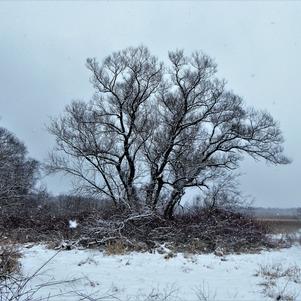General Description
Bloom Description: Blooms March to May. Flowers are white and are arranged in branched clusters that spring up from the shrub's stem. Flower clusters form a dome shaped flat top.
Growth Habit & Shape: Suckering shrub that spreads by stolon or branches that root in when in contact with the soil. Will spread faster in wetter conditions and easily transplanted.
Soil Preferences: S. sericea will spread rapidly in wet, poor draining, and high nutrient soils. However, this shrub can survive a range of different soil conditions and will be less aggressive in spots with less ideal conditions.
Root Description: Can root in along the stem; Relatively shallow root system.
Garden Uses: Best in larger, naturalized spaces so it has room to spread. Good choice for moist forest border or other shrub border. Wetland gardens or natural areas.
Best Management & Maintenance: In order to maintain the red branches, old growth should be pruned out to encourage new red stemmed shoots.
Common Problems: May struggle in higher temperatures and doesn't do well in dry soils. According to University of Connecticut's Plant Database, Swida sericea may struggle with leaf and twig blights, canker and leaf spots, scale leaf miners, and bagworms.
Benefits
Ornamental Value: Swida sericea provides year round garden interest. It has the potential to flower twice in a season depending on location. In the fall leaves turn deep red. The striking red stems provide winter interest.
Wildlife Benefits: Larval host plant for the spring azure (Celastrina ladon). The shrub's fruit is an important food source to many birds such as crows, robins, catbirds, and blue birds. Swida sericea is also a nesting site for many bird species.
Other Practical/Environmental Benefits: Erosion stabilization and tolerant of deer browse, clayey soils, and floods.
Use in place of: Barberry and privet
Ecology
Habitat:
According to the US Forest Service Fire Effects Information System and Flora of North America, these shrubs can be found naturally in meadows, floodplains, marshes, swamps, bogs, fens, forests, woodlands, shrub thickets, shorelines, and river/stream banks.
Response to Disturbance: Seeds are hardy and will still sprout after disturbance.
Native State Distributions:
Canada: AB, BC, LB, MB, NB, NF, NS, NT, NU, ON, PE, QC, SK, YT
USA: AK, AZ, CA, CO, CT, DC, DE, IA, ID, IL, IN, KY, MA, MD, ME, MI, MN, MT, ND, NE, NH, NJ, NM, NV, NY, OH, OR, PA, RI, SD, UT, VA, VT, WA, WI, WV, WY
Wetland indicator status: FACW
Companion Plants:
Black willow (Salix nigra), skunk cabbage (Symplocarpus foetidus), wild sarsaparilla (Aralia nudicaulis), speckled alder (Alnus incana)
References
Return to Top
